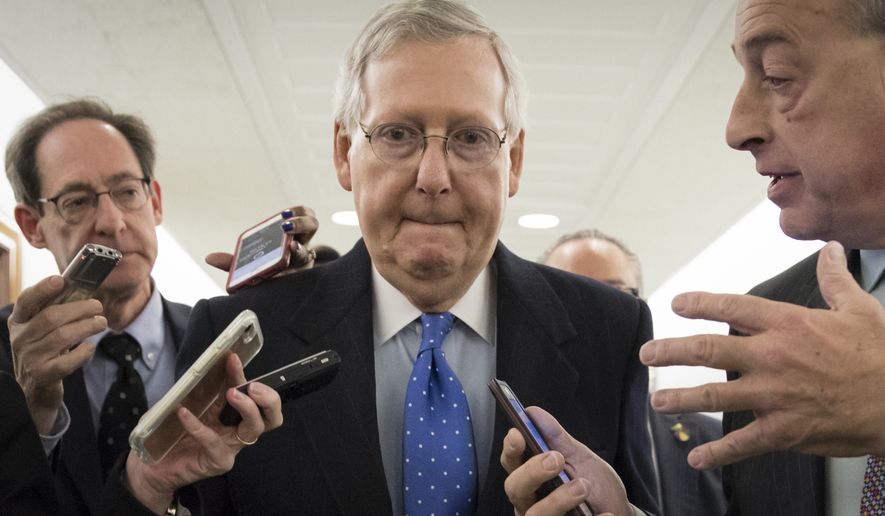Senate Republicans were struggling to keep their $1.4 trillion tax cut on track Thursday night after a key compromise crumbled, sending leaders scurrying for another last-minute rewrite to try to keep deficit hawks on board.
The hiccup came after the Senate parliamentarian said a “trigger” the deficit hawks had hoped to use to constrain the bill if it produced big deficits wouldn’t fly under the chamber’s rules. At least three Republicans had been counting on the trigger to justify support for the cuts. Without it, party leaders will have to find other ways to limit the bill’s costs.
Senators now face eliminating hundreds of billions of dollars in tax cuts from the package to satisfy the hawks such as Sen. Bob Corker, a Tennessee Republican whose vote is crucial to passage.
“When the trigger doesn’t work, you’ve got to come up with, I think, $350 billion. That makes everything different,” said Sen. Lindsey Graham of South Carolina. “So we’ll get there, ‘cause failure’s not an option.”
Republicans had been sprinting toward passage until the trigger mishap.
Now they likely will have to resort to yet another gimmick to game Senate rules, adding to a growing list of tricks.
One option is to let some tax cuts kick in later. Another is to sunset some of the tax cuts after a few years, with the hope that a future Congress would come back and extend them rather than allow a massive tax increase to hit.
That idea will draw fierce opposition from conservatives who say certainty is the key to a pro-growth tax overhaul.
Still, the pressure to notch a win could overcome some of those concerns.
“It all becomes a problem,” Mr. Graham said. “So that means some things may get delayed. There’s all kind of ways to fix this.
“The one thing you can’t fix is failing,” he said. “You can’t fix failing.”
Republicans did hold firm in shooting down multiple attempts from Democrats to upend the bill by sending the legislation back to the Finance Committee for more work.
Democrats came close to winning one vote, a motion by Sen. Angus S. King Jr., a Maine independent who sides with Democrats, that would have insisted the committee rewrite the bill so it would not add to the deficit.
Three Republican deficit hawks — Mr. Corker, along with Sens. Jeff Flake of Arizona and Ron Johnson of Wisconsin — threatened to vote with the Democrats but ultimately relented.
“We were this close,” Mr. King said, holding up his thumb and index finger.
Further hindering Republicans was a report Thursday by congressional scorekeepers, who said that even accounting for economic growth resulting from the tax plan, the package would deepen federal deficits by $1 trillion over a 10-year period.
“The score ends the fantasy about magical growth, about unicorns and growth fairies suddenly showing that tax cuts pay for themselves,” said Sen. Ron Wyden of Oregon, the ranking Democrat on the Senate Finance Committee.
Republicans disputed the figures and said congressional scorekeepers’ projections on long-term growth are too pessimistic.
“I think the good news in all this is what it demonstrates is what we’re trying to do here actually generates economic growth — it actually generates additional revenue for the federal Treasury,” said Sen. John Thune, South Dakota Republican.
The $1.4 trillion-plus plan would slash the corporate tax rate from 35 percent to 20 percent, cut individual rates, and eliminate certain exemptions and deductions while expanding others.
The House has passed its own version, and leaders there are eager to get a Senate bill so they can hammer out a compromise in a conference committee.
House Majority Leader Kevin McCarthy, California Republicans, told his troops that they should be prepared to come back to Washington a day early next week to begin work.
The House cuts the corporate rate to 20 percent and lowers individuals rates, but there are differences on items such as the state and local tax deduction, which the Senate eliminates but the House preserves in part.
The Senate plan also includes a repeal of Obamacare’s individual mandate, while the House version does not.
Ways and Means Committee Chairman Kevin Brady, Texas Republican, said lawmakers are prepared to reconcile the two but he wants to let the Senate finish its work first. He acknowledged they will ultimately be governed in part by Senate rules.
“We know at the end of the day Senate budget rules and reconciliation rules are the guardrails we just have to comply with,” he said.
Those fast-track rules, known as reconciliation, allow the Senate to pass its bill without facing a Democratic filibuster. But as conservatives found out during the Obamacare repeal debate, the rules also mean lawmakers can’t get overly ambitious and have to stay within a firm cost limit.
Even before the Republicans’ $350 billion problem, senators floated bumping the corporate tax rate up from 20 percent to pay for other priorities.
Sen. Mike Lee of Utah and Sen. Marco Rubio of Florida said a 22 percent rate could help pay for an expanded child tax credit, while Sen. Susan M. Collins of Maine has pushed for a 21 percent rate to help restore part of a local property tax deduction that was preserved in the House’s plan but not the Senate’s.
House Republicans, though, said they had no interest in a corporate rate higher than 20 percent.
“We have made it very clear that 20 percent corporate is the red line,” said Rep. Mark Meadows, North Carolina Republican and chairman of the influential House Freedom Caucus.
Mr. Meadows said he supports the Rubio-Lee effort, but “there has to be a different pay-for.”
“That dog won’t hunt,” he said of raising the corporate rate. “We’re not going to support that.”
• Tom Howell Jr. contributed to this report.
• David Sherfinski can be reached at dsherfinski@washingtontimes.com.




Please read our comment policy before commenting.